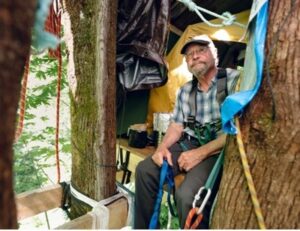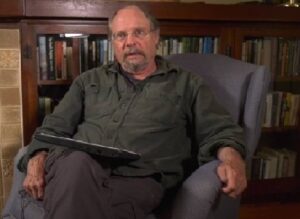An Interview with Dr. Tim Takaro
“My commitment to protecting the planet is indeed both a professional and a moral calling. Until this event, I had never been arrested. I have an unblemished criminal record and have been an upstanding member of each community where I have lived.”
On June 13, 2022 Dr. Tim Takaro spoke those words in BC Supreme Court. Two days later, he was sentenced to 30 days in jail for contempt of court. He would serve 21 days before being released from detention.

Dr. Tim Takaro sitting in his tree in protest
Takaro and five other people were arrested in November 2021 for breaching an injunction for the Trans Mountain pipeline expansion in Burnaby. As part of a tree-sit, Takaro had set up a platform 35 metres above the ground with a sign that proclaimed his opposition to the pipeline project. The tree in which he protested the pipeline was in part of a trail he had been regularly hiking for 17 years.
Decades earlier, Takaro’s focus on environmental health began at the University of North Carolina where he earned medical and master of public health degrees. Later, he taught at the University of Washington, picking up a degree in toxicology before moving to Canada in 2005 to join Simon Fraser University’s Faculty of Health Sciences.
Now a professor emeritus, he continues to teach students at SFU, the University of British Columbia and the University of Washington about the health impacts of climate change.
He has published over 100 peer-reviewed papers and is an expert legal witness in chemically related illnesses. Last year, he was a lead author in a Federal report on the Health of Canadians in a Changing Climate, co-writing a chapter on the quality, quantity and security of Canada’s water resources.
In advance of World Water Day, Takaro who is now 66 years old, spoke openly and passionately about his brush with the law, his environmental activism and his fearless commitment to planetary health.

Dr. Tim Takaro
GTEC: Our country has vast water resources. About one fifth of the world’s fresh water is in Canada. How effectively are we managing our water, especially in BC?
Dr. Takaro:As you are probably aware this past summer was, if not the worst, one of the worst droughts in BC history particularly on Vancouver Island but all over the province. We had many communities at level five drought and the persistence of that really is unprecedented. To me that indicates not only is Canada a major contributor to climate change because we continue to increase our emissions particularly from the oil and gas sector but we are also not ready for the future we are causing.
I have seen estimates that 90 percent of climate change effects will manifest themselves as water impacts, that the climate crisis is a water crisis. What are your thoughts about that characterization?
Of course, it’s a major factor in climate change. We can argue about whether famine is going to create more chaos than drought and flooding but I think that’s a foolish argument to get into. The point is that the world is facing a climate emergency. Water and food will be what people fight about as scarcities grow. Already in sub-Saharan Africa we’ve seen conflicts driven by water. Many people argue that the Syrian conflict was driven by water and food shortages. That’s the future. We’re not going to be fighting so much about oil, but about food and water.
In the report you co-authored for the federal government on climate change effects on water, what was especially concerning for you regarding impacts on the health of Canadians?
I think it was mainly the lack of awareness that there is a connection between our oil and gas emissions increasing global temperatures and the extreme weather events that we experienced, particularly in 2021 and then just in 2022. In 2021 in the heat dome, over 700 people in British Columbia died. People are not connecting those deaths to our policy in the oil and gas sector, and to me that is the most disturbing thing because it means we won’t be changing anytime soon.
It has been one year since that federal report was published. What response has there been to the findings on water issues in Canada?
I wish I did understand that better. I do think these events, the major flooding in 2021 also and then the drought, do make people aware of what’s happening. In terms of specific policy, certainly at the federal level all I have really seen is more promises for money for indigenous nations’ water systems. But there are still over 50 nations with boil water advisories and progress is very slow. So I hope there has been some progress since our report but I can’t say it’s so overwhelming that it’s noticeable.
Further to that report you wrote, to what extent will the health impacts disproportionately affect indigenous communities?
Of course, that is a huge issue. So all of these impacts of climate change are going to be felt more acutely on populations that are underserved by the usual civil supports and that includes indigenous nations. There is no doubt that the richest among us will build their resilience and protections that enable them to weather most of the climate change storms. They won’t be immune completely but at the same time there are individuals who are contributing most to carbon emissions with their private jets, multiple vacations and five houses and this and that. Those at the other end of the economic spectrum are going to feel these effects most strongly. There are many First Nations in British Columbia for example, that are in river and flood plains, coastal flood plains. We know what’s coming for them but there is very little effort to prepare for that, to plan for that. No effort to reduce emissions from our oil and gas sector.
You have examined water quality in BC communities, what have you found?
Our research has been focused on the effects of extreme rain events on water quality. We expected to find that these events would increase water borne disease rates in communities with marginal water systems. We used Vancouver as our control, and we actually found the effect in Vancouver. Remarkably we found the effects in the wealthiest and well controlled [area] in the province. The knowledge of this has pushed Vancouver to introduce filtration which they did not actually have.
A wealthy community can afford to mitigate the effects of these extreme water events but not the mid-range and lower income communities unless they really put a priority to it. So, it’s a major issue that is pretty much ignored.
You have been a passionate advocate for a cleaner environment, served time in jail for your actions protesting the Trans Mountain pipeline expansion, what sustains your environmental activism?
This is part of my responsibility as a public health physician. It is to work to change policies that are harming public health. Canadian energy policy is harming public health and will be for some time to come. In the case of the Trans Mountain pipeline I worked diligently for several years on two large reports on the health impacts of the pipeline. I was forbidden from including in these reports anything about the climate impacts. I was literally at the end of my rope.
Because I have climbing abilities and I knew there were many strategic trees in Burnaby that needed to be cut in order for the pipeline to be constructed, I chose non-violence civil disobedience as a public health response to the climate emergency.
What did you learn about yourself from that time served in jail?
It was actually a very good experience. I’m very glad I went through it. I’m sorry I had to go through it but I’m happy to have done it because it was a very good time for reflection. It was very interesting culturally to get to know the guys inside, how the system works. I certainly learned a lot about the legal system.
The first week was difficult because of the way you are treated during what’s called the induction period. They ignored a lot of the rules they had about letting people out of their cells. It’s a very tense situation but the next two weeks were much more pleasant and did provide time for writing, reflection, and reading. You have to know what you’re getting into. You have to have support around you. I am very privileged in that regard. So I found it to be quite an uplifting experience and removed the fear I had around going to jail for my beliefs.
Would you ever see yourself doing that again?
Well, certainly, yeah. This particular fight, the Trans Mountain pipeline expansion project, for me was definitely the right fight, at the right time, in the right place. I have the right training. Everything about it was right. So, if that condition emerged again, I could imagine coming back to jail, yeah. Just don’t tell my wife.
What do you think about those kinds of protest tactics as we’ve seen with the old growth forest protesters? How effective are those tactics in persuading public opinion?
I think it’s a really good question and very difficult to tell. It’s a bit like asking when Martin Luther King and other civil rights leaders were arrested on the Selma bridge and brutalized. That was quite a long time before change came but definitely that event was part of the change. So, how effective, it varies over time and also the particular action. We didn’t piss anyone off except for Trans Mountain and maybe the Burlington Northern Railway. So we didn’t have the kind of backlash that Save Old Growth had from people being inconvenienced on the freeway. It’s interesting to me that just this past week in Israel, people protesting the loss of judicial independence also blocked the main highway into Tel Aviv. People understand that it’s effective. If it wasn’t effective, people wouldn’t take those risks.
How hopeful are you about meaningful action in the future on climate change?
I try to remain hopeful because the alternative is very debilitating. So, that’s why I think we will find our way. The major concern I have is that it will be too little, too late particularly when it comes to global conflict. I think we are already down that road. I expect the next few years will show that climate-related famine is a real thing. I’m not sure that people are getting the message on that yet. And it will show it really makes a big difference when the Alps get less than half of the snow they expected in the winter or the glaciers in the Himalayas shrink to the point that the Punjab runs out of water. These are going to be massive impacts and they are going to hurt the most vulnerable.
I just shake my head and wonder that you can have a United Nations Secretary-General be very clear that building fossil fuel energy infrastructure should not be built but so-called democracies like Canada continue to build new fossil energy infrastructure.
The great impacts are going to be on future generations, those people who have no voice at the moment, and that is a real tragedy because our economic policy has this weird thing where they discount the value of life in the future which is perverse. I think our policy makers are not adequately considering the impacts on future generations.
(This interview was edited for brevity)


